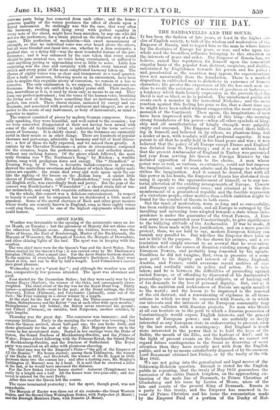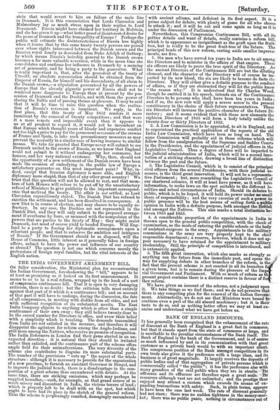TOPICS OF THE DAY.
THE DARDANELLES AND THE SOUND.
IT has been the fashion of late years, at least in the higher cir- cles of English society, to talk of the wisdom and moderation of the Emperor of Russia, and to regard him as the man in whose hands lay the destinies of Europe for peace or war, and who upon the whole used the boundless influence belonging to this situation in the interests of peace and order. The Emperor of Russia has, we believe, raised this reputation for himself upon the somewhat singular basis of the popular fear, distrust, suspicion, and dislike, entertained by Englishmen towards his person and his policy ; and, paradoxical as the assertion may appear, the superstructure rises not unnaturally from the foundation. There is a marked disposition in cultivated men to disbelieve in extremes of human. character ; the greater the experience of life the less such men in- cline to credit the existence of monsters of goodness or badness,— a tendency which finds homely expression in the proverb that the Devil is not so black as he is painted. The uninformed public did create such a monster in the terrestrial Nicholas ; and the mere reaction against this feeling has gone so far, that a short time ago he might have been called without exaggeration the most respected monarch of the Continent. Then again, the imaginations of men have been impressed with the reality of this king—the seeming strong foundations of his power—when all other symbols of king- ship and all manifestations of kingly strength were palpably empty and unsound. The Emperor of Russia stood there believ- ing in himself, and believed in by others, no phantom-king, but a leader of men, with resolute will and profound sagacity. It was patent to all that he really held in his hand peace and war; it was believed that the policy of all Europe except France and England was dictated from St. Petersburg ; and it is not without belief that the present Ambassador of England in Turkey was prevented last year from serving his Queen as Foreign Minister by the declared opposition of Russia to the choice. A man whose power was so real, so various, so extensive, could not but impress the imagination; and we soon admire and do homage to whatever strikes the imagination. And it cannot be denied, that with all this power in his hands, the Emperor of Russia has abstained from using it openly to the aggrandizement of himself, or to any ma- terial alteration of the existing arrangements of Europe. Cracow and Hungary are exceptional cases ; and criminal as is the dis- memberment •of a guaranteed republic and the forcible repression of a victorious people, other motives than selfish ambition might bo found for the conduct of Russia in both cases.
But the mask of moderation, worn so long and so successfully, has been suddenly thrown aside, and all Europe is outraged by the insulting and menacing tone adopted towards a state whose inde- pendence is under the guarantee of the Great Powers. A Rus- sian army is concentrated near Constantinople, to give significance to the bullying attitude of the Ambassador. H war be made, it will have been made with less justification, and on a more puerile pretext, than, we are bold to say, modern European history can furnish any parallel to. But whether the Emperor draw back or not is little to the purpose. He has shown his animus, and a re- tractation will simply amount to an avowal that he over-calcu- lated the effect of the causes of disunion existing among the great European Powers, and probably long fomented by his agents. Doubtless he did not imagine, that, even in presence of a com- mon peril to the dignity and interest of all three, England, Austria, and France, could overcome recent motives of sus- picion, and cordially unite in policy and action. He is mis- taken; and he is between the difficulties of proceeding against united Europe, or of offending by disavowal of his Ambassador's proceedings one of his most powerful sub'ects, or of backing out of his demands to the loss of personal dignity. But, end as it may, the ambition and recklessness of Russia are again manifest to the world ; and the lesson to be impressed is the renewal of the old distrust, and a reawakening of vigilance in all trans- actions in which we may be concerned with Russia, or in which our interests and the interests of the European community may come into collision with Russian projects. No man who thinks at all can hesitate as to the peril to which a Russian possession of Constantinople would expose English interests, and the general balance of European power ; and we are certainly as deeply interested as any European state in endeavouring to prevent, even by the last resort, such a contingency. But England is much more interested in the power that is to hold the keys of the Baltic, the mouth of the Elbe, and the harbour of Kiel ; and in the light of present events on the Dardanelles, we cannot but regard future contingencies in the Sound as deserving of more attention than they have recently met with from the English public, and as by no means satisfactorily disposed of by the answers Lord Beaumont obtained last Friday, or by the treaty of the 8th May 1852. We are not going into the genealogical and legal mazes of the Schleswig-Holstein question. Enough is stated for the English public in repeating, that the treaty of May 1852 guarantees the succession of the entire Danish kingdom, on the approaching ex- tinction of the male line of Denmark, to Prince Christian of Glucksburg and his issue by Louisa of Hesse, niece of the
late and cousin of the present King of Denmark. Russia is a party to this treaty, and the Emperor has renewed in fa- vour of Prince Christian and his issue the renunciation made by the Emperor Paul of a portion of the Duchy of Hol-
stein that would revert to him on failure of the male line in Denmark. It is this renunciation that Lords Clarendon and Malmesbury lay so much stress upon in their replies to Lord Beaumont. Russia might have claimed her territory in Holstein, and she has given it up—what better proof of disinterested desire for the peace of Denmark and the tranquillity of Europe ? Perhaps the public will estimate the disinterestedness of Russia less highly when it learns that by this same treaty twenty persons are passed over whose rights intervened between the Danish crown and the Russian royal family as descended from Duke Adolph of Gottorp ; by which means Russia's heirship general to the Danish crown becomes a far more valuable reversion, while in the mean time she consolidates and confirms her influence in Denmark by a seeming act of generosity, and by being a party to the guarantee. What is really important is, that, after the precedent of the treaty of Utrecht, an absolute renunciation should be obtained from the Emperor of Russia, for himself and his descendants, of all claim to the Danish crown,—a stipulation guaranteed by all the powers of Europe that the already gigantic power of Russia shall not be rendered more dangerous to Europe than at present by the pos- session of Denmark and the Duchies, and with them the power of closing the Baltic and of passing thence at pleasure. It may be said that it will be time to raise this question when the realiza- tion of Russia's reversion is imminent. We reply, in the first place, that this treaty of May 1852 renders it more imminent by the removal of twenty competitors ; and that were it a more remote and impossible event than it appears to us at all prudent to regard it, it would yet be incumbent on that Europe which thought years of bloody and expensive conflict not too high a price to pay for the permanent severance of the crowns of France and Spain, to take such precautionary measures as may prevent the necessity in a similar ease of having recourse to similar means. We take for granted that Europe never will submit to see Denmark united to the crown of Russia, as we know that England could not submit to it without endangering her commerce, her honour, and her very national existence. Why, then, should not the opportunity of a new settlement of the Danish crown have been made the occasion of embodying in the public law of Europe a satisfactory guarantee on this most important point? Why, in- deed, except that Russian diplomacy is more able, and English diplomacy more stupid, than that of any other great country ! We trust that this question will not be allowed to rest, and that mem- bers of both Houses will refuse to be put off by the unsatisfactory refusal of Ministers to give publicity to the important correspond- ence that motived the treaty. The affair is not settled, as Lord Clarendon superciliously stated. The Danish Diet has refused to sanction the settlement, and has been dissolved in consequence. A new Diet is in course of election, and may chance to be equally re- fractory. In any ease, the Duchies are not represented in the Danish Diet, and they will only submit to the proposed arrange- ment if overborne by force, or menaced with thevompulsion of the powers that are parties to the treaty of May : they might resist Denmark, but must of course yield to banded Europe. Will Eng- land be a party to forcing her diplomatic arrangements upon a reluctant people, and that to subserve the ambition and intrigues of Russia? If the Government should be so disposed, will the House of Commons, little interest as it generally takes in foreign affairs, submit to have the power and influence of our country so abused? The question is not one which concerns merely the pretensions of foreign royal families, but the vital interests of the English nation.

























 Previous page
Previous page